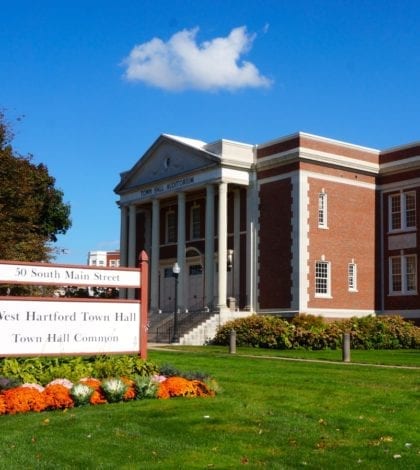West Hartford Town Manager Proposes $288.3 Million Budget

Audio By Carbonatix

West Hartford Town Hall. Photo credit: Ronni Newton
Total expenditures will increase by $2.7 million compared to the budget the West Hartford Town Council adopted for FY2018, or an increase of $9.7 million when last year’s $7.1 million contingency fund is netted out.
By Ronni Newton
Town Manager Matt Hart presented his budget for FY2019 to the Town Council on Monday night, a $288,319,336 spending plan that is an increase of $9,723,163 over the FY2018 budget net of a $7.1 million contingency fund.
The contingency fund was established last year due to the uncertainty of state aid that the town would be receiving. Hart said that the budget was restated with the contingency removed, in order to provide “an apples-to-apples comparison” and be fair in the analysis since the $7.1 million was neither taxed for nor allocated.
“If left in, it would distort the increase for next year. It would appear much lower,” Hart said.
Property taxes will need to increase by $9,189,851 to support the proposed spending plan for FY2019, offset in part by growth in the grand list of 0.778 percent, which will generate approximately $1,974,000 additional revenue.
Hart said that management “worked very hard to produce a responsible budget, a responsible budget for our community that would strike the right balance between spending and tax increases,” He asked department heads to submit a detailed, line-by-line breakdown of their expenditures, rather than just moving ahead on a roll forward basis.
“It was very important to maintain our current services and programs and the budget does that,” Hart said. Another important objective with this proposed budget was increasing the undesignated fund balance in order to maintain the town’s top credit rating.
“In order to finance this budget, management is recommending we move to a uniform mill rate,” Hart told the Town Council Monday night. He is recommending a mill rate of 41.54 mills for FY2019, for real and personal property as well as for motor vehicles.
The FY2018 mill rate was split – at 41.04 mills for real and personal property and 32.00 mills for motor vehicles. The 32.00 mill rate for motor vehicles had been set as a cap for municipalities in the budget initially proposed by Gov. Dannel P. Malloy in February 2017, and although ultimately the cap was not required, the Town Council voted on Dec. 12, 2017 not to issue a supplemental tax bill increasing the rate.
The 41.54 mill rate represents an increase of 1.22 percent for real and personal property, and 29.86 percent for motor vehicles. Hart said that the uniform rate is “really best for your typical homeowner because the increase on the real estate side is more modest.”
As has been the case the past several years, an apples-to-apples comparison is difficult to calculate, but according to Hart’s analysis, the average homeowner with two vehicles will see taxes increase by $284, or 2.91 percent, (from $9,769 to $10,053) for FY2019. In West Hartford, the “average” homeowner has a home assessed at $224,000, and two vehicles assessed at $9,000 each.
Included in the town manager’s proposed budget is the $164,551,527 education budget proposed by Superintendent Tom Moore to the Board of Education on March 6. That budget includes $4,693,773 (2.94 percent) in additional spending for FY2019. Salaries as well as the cost of special education and transportation, are some of the primary costs driving the education budget increase.
Funding for education is approximately 57 percent of the town’s budget. Every town in the state has education costs as the lion’s share of the budget, Hart said, and in some smaller communities it could be as much as 80-90 percent.
Expenditures for town services, which account for 37 percent of the total budget, are proposed to increase $4,842,106, or 4.78 percent, and capital financing costs (6 percent of the budget) will increase by $187,282 under the town manager’s proposed budget.
While the increase in town services appears substantial, the cost drivers are primarily due to expenditures that are not controllable.
There are no new programs, nor are there any new positions, included in the proposed FY2019 budget. In fact, Hart said, total staff will decrease by one. An assistant fire chief position to oversee the paramedic program, which was approved for FY2018 but never filled, will instead be outsourced to a contractor. Wages and salaries are budgeted for an overall decrease of $288,994.
The most significant driver for the increase in expenditures in FY2019 is an actuarially-determined increase of $2.3 million for employer contributions (ADEC) to the pension fund. A portion of that increase is due to reallocation of pension costs between from the education portion of the budget to the town side. In the past the education budget included 25 percent of town pension costs, but an actuarial analysis has dropped that share to 21.33 percent of the total.
Hart said that pensions are the “800-pound gorilla,” but the work that the town has done over the past several years to eliminate unfunded liabilities is beginning to have an impact.
Another significant increase is $1,732,862 that will be set aside to cover unsettled labor contracts. All of the town’s collective bargaining agreements are coming up for renewal and are under discussion right now.
In addition, the Metropolitan District Commission (MDC) is increasing the town’s ad valorem tax for wastewater service by just over $1 million, or 10.8 percent. “We’ve been concerned for some years now about whether or not this is fair,” Hart said. He and Chief Financial Officer Peter Privitera are working with the MDC to study a user fee, but as for now the ad valorem tax remains in place.
Based on claims experience, medical costs will be increased by $967,577 for FY2019.
The town’s refuse hauling contract, which has been renegotiated, will positively impact the FY2019 budget, and result in a savings of $1.1 million. Hart expressed his thanks to Public Works for negotiating that contract.
The proposed budget contemplates increasing the town’s unreserved General Fund balance to 9.1 percent by June 30, 2019, an action recommended by Moody’s and deemed necessary to preserve West Hartford’s AAA bond rating. In December 2017, the Town Council approved the transfer of $3.2 million of surplus from FY2017 into the General Fund, increasing the ratio from 8.1 to 9 percent. A total of $293,000 will be added to the fund accomplish this.
On average, AAA-rated communities maintain a balance of 13.5 percent, Hart said in his executive summary, and West Hartford is aiming to reach at least 10 percent gradually over the next several years. “A credit rating drives your interest rate, the interest rate the town will pay on the bonds it issues,”: Hart said, and directly impacts taxpayers.
Hart said that town staff is currently estimating a surplus of $6,911,688 for FY2018. He is recommending a transfer of $3.7 million of those funds in order to limit tax increases for FY2019. The recommended transfers are $500,000 to the debt service fund, $300,000 to the utilities service fund, and $1.5 million to the risk management fund. In addition, Hart is recommending that $1.4 million of surplus be transferred to the Capital Non-Recurring Expenditure (CNRE) fund to offset debt service costs and reserve bond capacity for future capital projects.
The town’s 12-year Capital Improvement Plan is $197,621,000. Hart said that $148,084,000 is financed through bonds, $25,406,000 comes from the CNRE, $22,531,000 comes from Federal or state grants, and $1,600,000 comes from other sources. Major upcoming projects include the Fern Street bridge over Trout Brook estimated to cost $4.2 million ($3 million by grants and $1.2 million by bonds), $500,000 in improvements at Wolcott Park, and $290,000 for refurbishing the bath house at Kennedy Park and making it accessible.
Property taxes account for 88.5 percent of the town’s revenue, Hart said. The FY2019 budget incorporates the governor’s latest proposed intergovernmental revenues – which represents a decrease of $85,587 or 0.4 percent below what the town received last year. “While that appears negligible it’s becoming harder to absorb,” Hart said, and the $21.1 million for FY2019 is lower than what the town received in FY2014. Intergovernmental revenue is 7.3 percent of the town’s revenue.
Going forward, Hart also outlined strategies for the future, current initiatives as well as some new ideas, meant to keep the community affordable for current residents and attract new residents and businesses.
The long-term goals includes strategies to “promote sustainable growth and revenue diversity.” Retention of businesses is just as important if not more important the recruiting new businesses, Hart said. Redevelopment of key commercial areas, and exploring a diversification of local revenues is also important. One example of possible new revenue is through transportation for paramedic services.
Hart also said long-term strategies should focus on controlling and reducing expenditures, although some suggestions involve spending money in the short-term for long-term gain.
Suggestions include sharing some services with other municipalities, converting the MDC ad valorem tax to a user fee, increasing the fund balance to shore up the bond rating, considering funding smaller capital projects through the CNRE rather than bonds, continuing to modify employee benefits programs, periodically rebidding contracts and services, continuing to adjust the pension discount rate, restructuring pension and OPEB liabilities, and taking a critical look at departments and assessing best practices.
The public will have the opportunity to comment on the budget at public hearings scheduled for Wednesday, April 4 at 6 p.m. and Wednesday, April 11 at 2 p.m., both at Town Hall.
Other public meetings include a Board of Education budget workshop on March 14 at 7 p.m. at Town Hall; Board of Education public hearing on March 28, at 7 p.m. at Town Hall followed by a workshop; and adoption of the Board of Education budget at 7 p.m. on April 3 at Town Hall.
The Town Council is scheduled to adopt the budget on Tuesday, April 24. That meeting will begin at 7:30 p.m.
All budget documents will be available for review on the town’s website.
Like what you see here? Click here to subscribe to We-Ha’s newsletter so you’ll always be in the know about what’s happening in West Hartford!




Wow, I have to say I’m really impressed with our new town manager. Nobody likes tax increases, but I can see we do need to be increasing unreserved General Fund, we’ve been lucky to have the rating we have maintained with the general fund levels we’ve had. This budget is spending money where we need it, while keeping new staffing tamped down. I think it is good to have a uniform mill rate. I’m glad Matt realizes we need diversity in revenue and also retention of biz, and not just keep chasing new biz, I have been fretting about these concerns. This is a budget with a goal of looking toward the future, not just to tide us over another rough year with the state. I hope that there will be ongoing efforts to discern with a fresh set of eyes where costs can be reduced.
What the Town Manager has said, has been said by previous Managers-nothing new. Tax increases just about every year since i bought my home some 12 years ago-which is just ridiculous. The net result of this will be a town of wealthy to very wealthy people, and very little else. All this talk about diversity and demographics goes away if this town cannot find another way to fund itself. I really like living here but have to wonder how much longer that will be.
[…] Monday, the Town Council received the FY2019 budget from Town Manager Matt Hart. The Board of Education as well as the Town Council will be hearing comments from the public at […]
[…] the West Hartford Town Council Wednesday night at the first of two scheduled public hearings on the town manager’s proposed $288.3 million budget for 2018-19, and both requested modifications to the budget during the approximately five-minute […]
[…] FY2019 budget on April 24, but the document they will consider has been somewhat changed since the budget was originally proposed by Town Manager Matt Hart on March […]